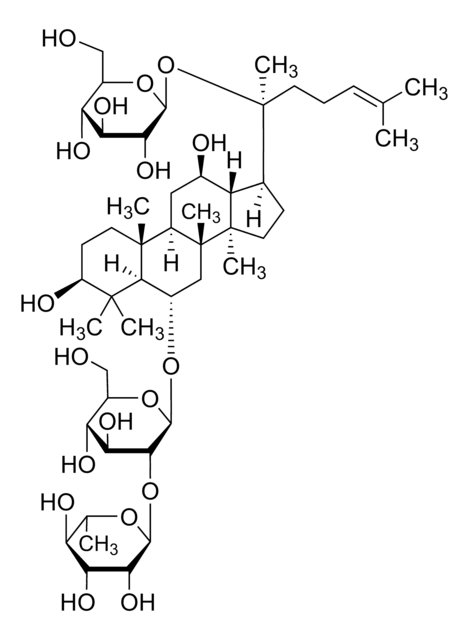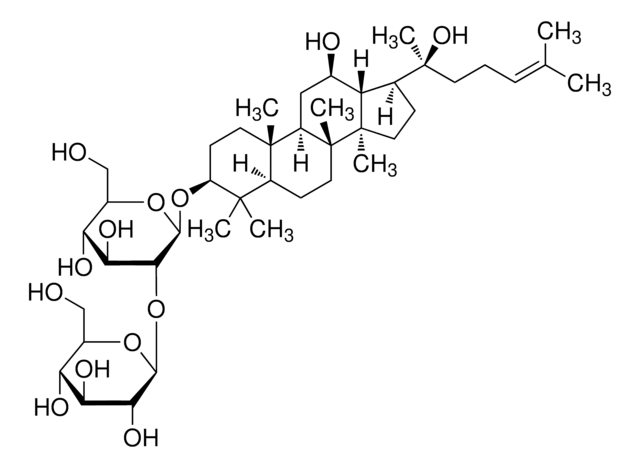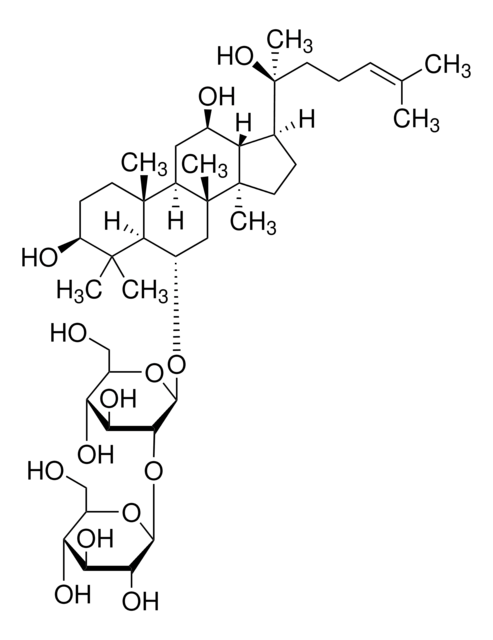41868
Ginsenoside Rb2
analytical standard
Synonym(s):
(3β,12β)-20-[(6-O-α-L-Arabinopyranosyl-β-D-glucopyranosyl)oxy]-12-hydroxydammar-24-en-3-yl 2-O-β-D-glucopyranosyl-β-D-glucopyranoside, NSC 308878
About This Item
Recommended Products
grade
analytical standard
Quality Level
Assay
≥95.0% (HPLC)
shelf life
limited shelf life, expiry date on the label
technique(s)
HPLC: suitable
gas chromatography (GC): suitable
application(s)
food and beverages
format
neat
storage temp.
2-8°C
SMILES string
C\C(C)=C/CC[C@](C)(O[C@@H]1O[C@H](CO[C@@H]2OC[C@H](O)[C@H](O)[C@H]2O)[C@@H](O)[C@H](O)[C@H]1O)[C@H]3CC[C@]4(C)[C@@H]3[C@H](O)C[C@@H]5[C@@]6(C)CC[C@H](O[C@@H]7O[C@H](CO)[C@@H](O)[C@H](O)[C@H]7O[C@@H]8O[C@H](CO)[C@@H](O)[C@H](O)[C@H]8O)C(C)(C)[C@@H]6CC[C@@]45C
InChI
1S/C53H90O22/c1-23(2)10-9-14-53(8,75-47-43(67)39(63)37(61)29(72-47)22-69-45-41(65)34(58)26(57)21-68-45)24-11-16-52(7)33(24)25(56)18-31-50(5)15-13-32(49(3,4)30(50)12-17-51(31,52)6)73-48-44(40(64)36(60)28(20-55)71-48)74-46-42(66)38(62)35(59)27(19-54)70-46/h10,24-48,54-67H,9,11-22H2,1-8H3/t24-,25+,26-,27+,28+,29+,30-,31+,32-,33-,34-,35+,36+,37+,38-,39-,40-,41+,42+,43+,44+,45-,46-,47-,48-,50-,51+,52+,53-/m0/s1
InChI key
NODILNFGTFIURN-GZPRDHCNSA-N
Looking for similar products? Visit Product Comparison Guide
Related Categories
Application
Packaging
Other Notes
Signal Word
Warning
Hazard Statements
Precautionary Statements
Hazard Classifications
Acute Tox. 4 Oral
Storage Class Code
11 - Combustible Solids
WGK
WGK 3
Flash Point(F)
Not applicable
Flash Point(C)
Not applicable
Choose from one of the most recent versions:
Already Own This Product?
Find documentation for the products that you have recently purchased in the Document Library.
Customers Also Viewed
Articles
Optimize HPLC method for ginsenoside separation using a mixture, applying it to American Ginseng root, with conditions and chromatograms shown.
Optimize HPLC method for ginsenoside separation using a mixture, applying it to American Ginseng root, with conditions and chromatograms shown.
Optimize HPLC method for ginsenoside separation using a mixture, applying it to American Ginseng root, with conditions and chromatograms shown.
Optimize HPLC method for ginsenoside separation using a mixture, applying it to American Ginseng root, with conditions and chromatograms shown.
Our team of scientists has experience in all areas of research including Life Science, Material Science, Chemical Synthesis, Chromatography, Analytical and many others.
Contact Technical Service















